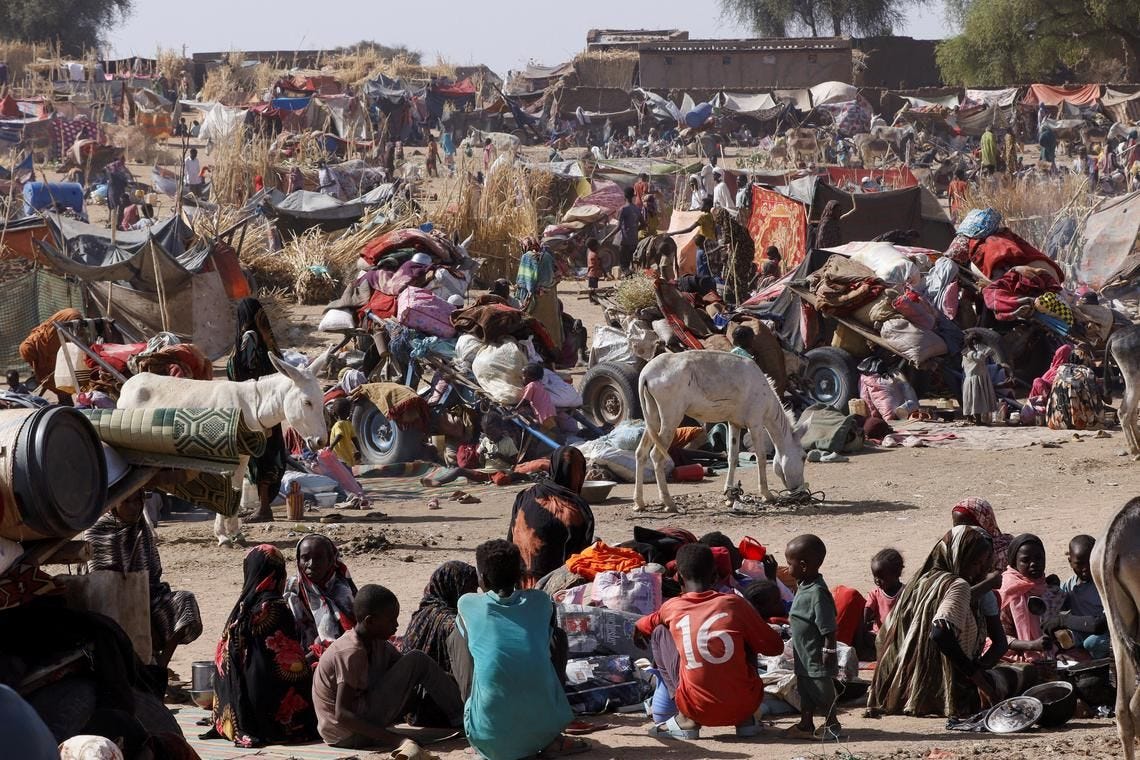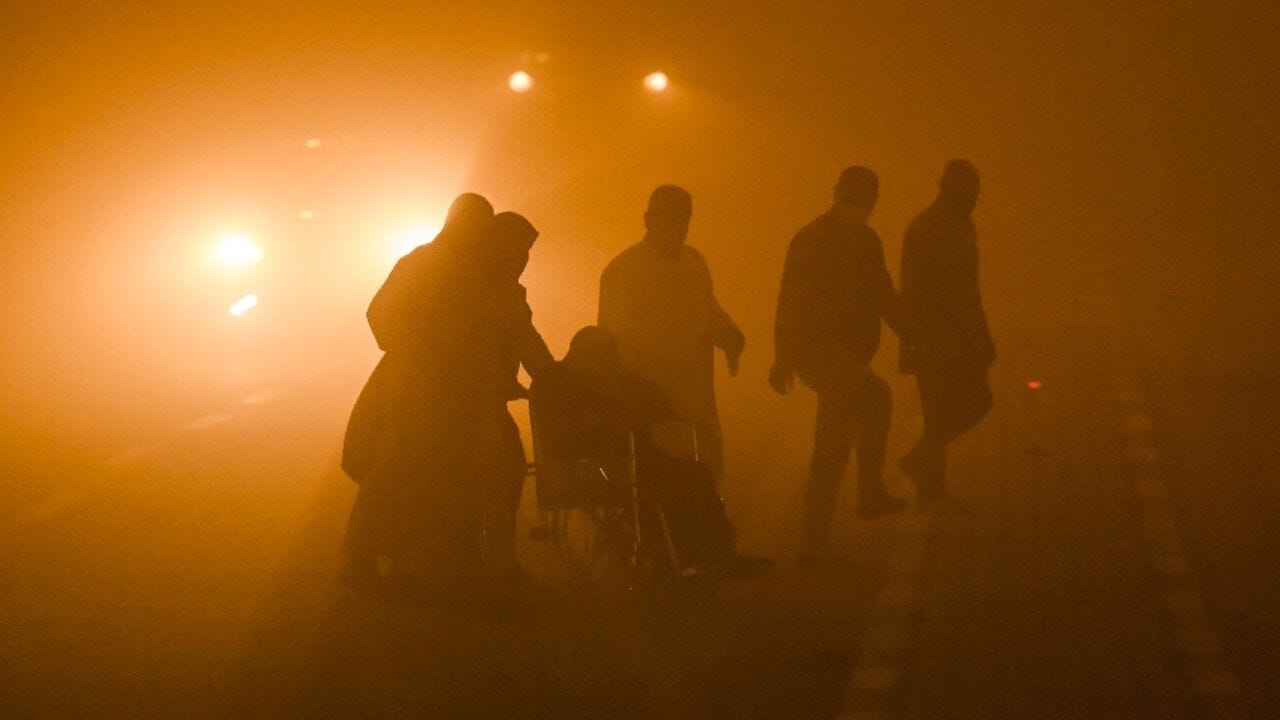Not Your Casual News Week 16: RSF escalates offensive in Sudan's Darfur
A weekly read to keep you in the loop on international news and climate issues

Sudan’s Rapid Support Forces (RSF) have escalated their military campaign in Darfur with a devastating attack on the Zamzam displacement camp, killing at least 300 people and forcing 400,000 to flee, the UN reports.
The paramilitary group, accused of genocide and crimes against humanity, targeted the camp near the besieged town of El-Fasher — the last major Sudanese Armed Forces (SAF) stronghold in Darfur — during a four-day offensive that destroyed shelters, markets and medical facilities.
“They started entering people’s houses, looting... they killed some people... After this people fled, running in different directions. There were fires. They had soldiers burning buildings to create more terror,” one survivor told Reuters.
“People who are scared always go to the mosque to seek refuge, but they went into every mosque and shot them,” another man recalled.
RSF claimed the camp was a militant base, but humanitarian groups condemned the attack as a deliberate assault on a vulnerable population facing famine.
Nine Relief International staff, including doctors, were killed in the attack on Zamzam. They are the last remaining international aid workers in the area.
On 14 April, RSF announced that it had taken full control of the Zamzam and Abu Shouk camps, home to some 750,000 people.
RSF’s siege of El-Fasher has restricted aid access, leaving thousands without food and medical supplies. The conflict, now in its third year, has displaced millions and drawn international condemnation for systematic human rights violations.
What Else Happened?

Serbian protesters reach Strasbourg after 13-day bike ride. Eighty Serbian students completed a 1,400-kilometre bike ride to Strasbourg, France, arriving on 15 April after 13 days, to demand EU action against democratic backsliding and corruption in Serbia. “A red carpet has been laid on the main square, Serbian flags are flying and the gathered people are carrying various banners, mostly with the inscription ‘Pumpaj’", describes the Serbian news magazine Vreme. The protest, sparked by a train station collapse in November 2024 that killed 16 people, has grown into nationwide demonstrations against the government of President Aleksandar Vučić.
Bangladesh court issues arrest warrant for former British minister Siddiq. A Bangladeshi court has issued an arrest warrant for Tulip Siddiq, a British Labour MP and former UK minister, over allegations of illegal land acquisition linked to her aunt, ousted Bangladeshi Prime Minister Sheikh Hasina. Siddiq, who resigned as business minister in January, denounced the charges as a “politically motivated smear campaign” and denied owning any property in Bangladesh. The arrest warrant names more than 50 people, including Siddiq’s family members, as part of a wider anti-corruption investigation into Hasina's government.
Herder-farmer clashes kill 51 in Nigeria. At least 51 people have died in Nigeria’s Plateau state after renewed clashes between predominantly Muslim Fulani herdsmen and Christian farmers, on 14 April. Wakili Tongwe, a local community leader, told reporters that “the attackers invaded the village in the early hours of Monday and shot sporadically at residents, who were scampering for safety after hearing gunshots.” The violence, rooted in competing claims to arable land and water, has been exacerbated by climate change, population growth and the breakdown of traditional conflict resolution systems.
Death toll in DRC boat disaster rises to 148. The death toll from the fire and capsizing of the HB Kongolo boat on the Congo River has risen to 148, with more than 100 still missing, officials confirmed on 19 April. The overloaded wooden boat, carrying around 500 passengers, caught fire near Mbandaka on 15 April after a woman's cooking sparked flames. Panicked passengers, including women and children, drowned after jumping into the river, while survivors suffered severe burns. “Boating accidents are common in Congo, where old, wooden vessels are the main form of transport between villages and are often loaded far beyond capacity,” explains Reuters.
US air strikes hit Sanaa killing 12 people. US air strikes targeted a market and residential area in the Yemeni capital Sanaa on 20-21 April, killing at least 12 people and wounding 30, according to Houthi officials. The attacks hit the market in the Shu’ub district, the Farwa neighbourhood and sanitation facilities in the Ma’een district. The Houthi-run Health Ministry condemned the raids as targeting civilians, while the US has not commented on the specific strikes. The attacks follow a deadly strike on the port of Ras Issa on 17 April, which killed 80 people, as part of a months-long campaign by the Trump administration against Houthi forces.
Climate News

Iraq sandstorm hospitalises 3,700. A sandstorm swept across central and southern Iraq on 14 April, forcing the closure of Basra and Najaf airports and sending 3,747 people to hospital with respiratory problems. Visibility dropped to less than one kilometre, shrouding cities in an orange haze as choking dust overwhelmed residents. Basra province reported more than 1,000 cases, while Baghdad and Muthanna recorded 1,014 and 874 admissions respectively. Most patients were treated for dust inhalation and discharged without death. The Iraqi Ministry of Environment warns of increasing “dust days” due to climate change — such as the 2022 sandstorm, where one person died and 5,000 were hospitalised. The UN ranks Iraq as one of the five most vulnerable countries to climate change.
Bhutan bets on green cryptocurrency to drive economic growth. Famous for its Gross National Happiness (GNH), an index that measures the collective happiness and well-being of its people, Bhutan has embarked on a strategic shift to harness its abundant hydropower to mine ‘green’ cryptocurrencies in a bid to boost its economy, create jobs and stem brain drain. The Himalayan kingdom’s sovereign wealth fund, Druk Holding and Investments (DHI), has mined more than $600m (€524m) in bitcoin using 100% renewable energy since 2019, with the revenue funding two years of public sector salaries. “We are a nation that runs 100% on hydropower, and every digital coin we mine in Bhutan using hydropower offsets that coin which gets mined using fossil fuels,” Ujjwal Deep Dahal, the CEO of DHI, told Reuters. “So a coin mined in Bhutan will contribute to the green economy.”
Climate change worsens allergies worldwide. Rising temperatures and CO₂ levels are lengthening pollen seasons and increasing the severity of allergies worldwide, researchers from the George Washington University School of Medicine and Health Sciences found. “Sixteen studies reported longer pollen seasons and/or higher pollen concentrations related to climate change, with two projecting total pollen emissions to increase by 16-40% and pollen season length to increase by 19 days in North America,” reads the report. Urban heat islands and invasive species such as ragweed - which is spreading across Europe - are exacerbating sensitisation rates, which are projected to increase by 200% in some regions. Thunderstorm asthma events and increased pollen allergenicity further threaten public health, with US pollen counts up 46% since 2000.
Thanks for reading this week’s newsletter!
Take care.



